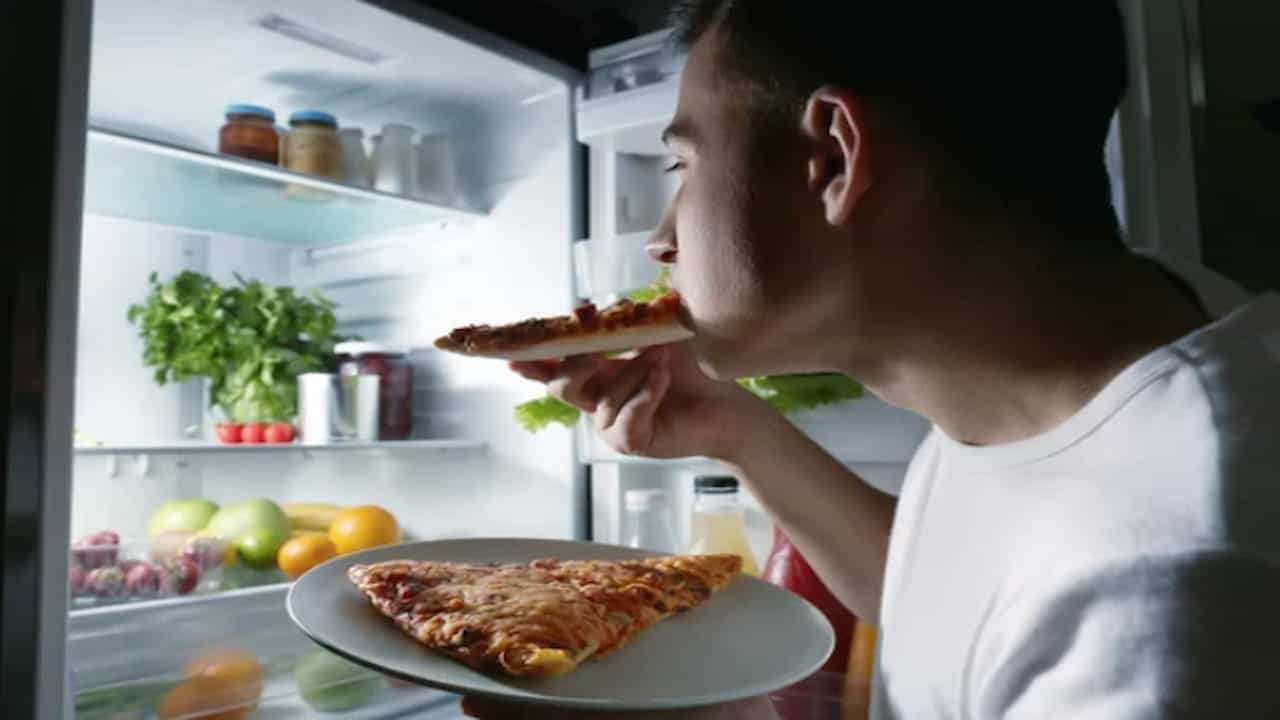Do you find yourself eating at night a lot?
Eating at night is associated with weight loss. People who eat at night usually do so because they don’t eat normally during the day.
Nighttime eating can be a health risk when uncontrolled as the calories are stored in fats. Excessive fat build-up risks diseases like hypertension, obesity, and diabetes. To ensure your blood sugars are balanced, you need to avoid eating at night.
So, are you wondering how to stop eating at night? This article will provide healthy habits to overcome your situation. Keep reading to learn more.

Hypnosis Downloads
More often, eating at night leads to weight gain. Deciding to try and hypnotize yourself to stop night eating can help end the habit of waking up at night to munch on something. It can further alter the emotional patterns that push you to eat at night.
Listening to audio downloads for hypnosis to stop night eating puts you into a deep stance where you feel relaxed. Hypnosis makes you aware of your actions and goes into your subconscious mind. In the state, you can face whatever triggers nighttime eating.
It is well known that hypnosis allows you to control your emotions in a safe way. It eliminates the emotional patterns that make you binge and replaces them with new patterns that fit you. You become livelier and more confident in yourself.
If you need to stop binging at night, hypnosis or self-hypnotherapy is worth considering. You can download the audios now at Hypnosis Downloads and begin a new episode of life and take control of your body weight. Besides, you can listen to the hypnosis audio over different devices, like your phone, tablet, or laptop.

Why Do I Crave Food at Night?
Craving for food at night is not just because you always do so or aren’t asleep. Late-night eating could be due to other triggers. Therefore, if you usually crave food at night, you first need to find out the cause.
You could be craving food due to an eating disorder known as night eating syndrome. People with night-eating syndrome eat to curb emotions and consume substantial food. They suffer insomnia, depression, obesity, emotional attachment, and lack of self-control.
One way to determine if you have night eating syndrome is to check if you eat more at night than during the daytime.
Stress and pre-existing eating disorders like binge eating disorders contribute to nighttime eating.
The body requires a balance between the two hormones; leptin and ghrelin. Leptin is responsible for satiety, while ghrelin is responsible for appetite. A shift in the hormones’ balance causes you to start overeating.

How Can I Suppress My Appetite at Night?
Eating at night can cause you confidence issues in addition to weight gain. So, how can you handle appetite at night? The following tips may help.
Practice Better Nutrition
Avoid ready-to-eat foods and highly processed foods because they contain high fats, sugar, and salt. The three properties encourage you to indulge uncontrollably. They trigger your brain to release dopamine which stimulates you to continue eating. Dopamine also inhibits the secretion of leptin, which leads to overheating.
Practice healthy eating where you focus on proteins, whole-grain starch packs, and leafy vegetables. Such foods will give you lots of energy and not leave you craving.
Have a Plan For Meals
Plan what time to eat so that nighttime does not find you unprepared. Arrange when to have dinner, lunch, breakfast, and snacks. The program will help you ensure that you do not miss a meal that might cause hormonal imbalances such as leptin and Ghrelin.
You should also restrict the amount of food you take and ensure you are satisfied before evening.
Ask for Support
If you find yourself eating late at night, you may seek support from your family. Let them know how you feel so they can understand you.
Secondly, you must seek the help of a therapist or nutritionist with experience in eating disorders. Psychotherapy for the nighttime eating syndrome employs cognitive behavior therapy (CBT).

Can You Lose Weight by Not Eating at Night?
In most cases, nighttime eating will lead to weight gain. When you eat at night, you increase the amount of calorie intake past what your body requires at night.
Your body cannot burn food at night as it would during the day because metabolism decreases from morning to evening.
Eating at night has other factors to it. For example, you are more likely to over-indulge in food at night than during the day. One reason is that your mindfulness to eating at night is lower as you could be eating while reading or watching TV, thus ending up overeating. The result of overeating is weight gain.
When you start eating at night, you begin a cycle of feeling hungry at night and packed in the morning. Your body may get used to storing calories at night in the form of fats.

However, eating a bedtime snack can lead to weight loss for some people. How?
After dinner, eating a healthy snack can manage your appetite and curb nighttime eating. The snack may make you feel satisfied and end up eating less than you would typically eat. If the habit continues over a long time, you may end up having weight loss.
What Should I Eat If I Feel Hungry at Night?
When it is evening or night, and you are hungry, you will starve simply because late-night eating is unhealthy. You will have to take in something though you should not make it a routine. So, if you must eat, it is advisable to eat snacks to help curb nighttime eating.
As much as you eat something, avoid unhealthy foods rich in fat, sugar, or salt. Foods rich in these properties make your body relax and release the hormone dopamine. When the level of dopamine increases in the body, you tend to eat more and more to continue enjoying the happy feeling. The result of continued eating is overheating, which leads to weight gain.
Eating healthy involves eating snacks that do not contain fats and lots of simple sugars. Your body should not have unregulated blood glucose levels, stimulating food cravings.
Healthy night snacks contain melatonin tryptophan, which causes sleep and helps you sleep better without feeding again.

Some healthy snacks that you can take at night include:
- Chinese herbal tea
- Vegetables like beetroot and potatoes.
- Legumes like soybeans
- Fruits like strawberries, grapes, and cherries
- Eggs
- Nuts like walnuts, peanuts, pistachios, hazelnuts, almonds, and macadamia
- Bananas
- Dairy products like yogurt
- Fish sandwiches and fish
These are suitable snacks full of the amino acid tryptophan and melatonin, which help reduce food cravings and help you sleep better.
How Do I Stop Binge Eating at Night?
Binge eating disorder is manifested through symptoms like insomnia, depression, lack of self-control, and overeating. The following methods will help you overcome the habit.
Eat More During the Day
If you eat early in the day, you will likely be hungry at night. People who start eating early in the morning have less insulin resistance and lower blood sugar level. Hence, eating in the morning reduces the risk of contracting type 2 diabetes. To ensure you take in the majority of calories during the day to have enough energy at night and that you do not crave food.
Keep a Food Diary
Track your eating habits for some days. Take note of the time you usually eat. When you become engaged at work and fail to eat early in the day, you might find yourself eating at night. Keeping a food journal will enable you to account for the time you eat, which may help with weight loss. Take note of what you eat. A record of your diet will ensure you do not lose control and start overeating at night.

Program Your Snacks and Meals
Avoid disordered eating by drawing a schedule of when to eat what food. Plan when you need to eat a snack and have a full meal. It is advisable to have a snack and a small meal every two to three hours. Such a schedule will ensure you have a balance of blood sugar. Maintain the program so that your body becomes used to the natural cues of hunger and satiety.
Avoid Certain Routines
Avoid eating with other daily lifestyle activities like reading or watching at night. It will become a habit when your mind gets used to such a routine. So, you will always find yourself eating every time you do those activities at night and become triggers for eating.
If you must eat a snack, ensure it is a healthy snack and separate eating from any other activity. When you eat, focus on what you eat, not overdo it. You may also include silverware in your evening snack so that you increase your mindfulness. When you plan to have a specific place, e.g., dinner table, you will not eat anything that comes your way.
Get Adequate Sleep
Adequate sleep is essential to inhibit the secretion of the ghrelin hormone, which stimulates appetite. When you are asleep, secretion of the leptin hormone decreases, which means you will have a low satiety level.
So when you do not sleep enough, it might lead to increased body weight.

Final Thoughts
Several factors, among them stress, cause nighttime eating. It can lead to weight gain, among other side effects that threaten your well-being. If you find yourself eating at night, use the tips above to help fix the situation. Alternatively, see a therapist and explain to them your situation. Hypnosis for stop-night eating can be a valuable way to end nighttime eating.

